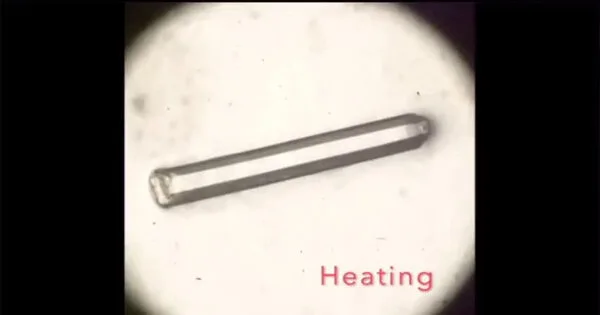According to new research, organic crystals, a new class of smart engineering materials, could end up functioning as sustainable and efficient energy conversion materials for advanced technologies such as robots and electronics.
Organic crystals, a new class of smart engineering materials, can serve as efficient and sustainable energy conversion materials for advanced technologies such as robotics and electronics, according to new research published today in the journal Nature Communications by a team of researchers at the NYU Abu Dhabi (NYUAD) Smart Materials Lab.
While organic crystals were traditionally assumed to be brittle, the NYUAD researchers revealed that some organic crystals are mechanically quite tough. They created a material that sets a new world record for its capacity to flip between shapes by expanding or contracting over half of its length without losing its perfectly-ordered structure.
Our research has demonstrated that organic crystals can not only match the needs of new technologies, but can even outperform the levels of efficiency and sustainability of other, more common materials.
Professor Pane Naumov
The team, led by NYUAD Professor of Chemistry Pane Naumov, presented the technique of measuring how the organic crystalline material behaved to different temperatures in the study titled “Exceptionally High Work Density of a Ferroelectric Dynamic Organic Crystal about Room Temperature.”
The organic crystals were discovered by the researchers to be able to reversibly alter shape in a manner comparable to plastics and rubber. This material, in particular, could continually expand and contract over half of its length (51%) through thousands of cycles without damage. It could also expand and contract at ambient temperature, unlike other materials that require a greater temperature to change, resulting in higher operating expenses.

Unlike previous materials, which are silicon- or silica-based and inherently rigid, heavy, and brittle, the materials utilized in future electronics will be soft and organic in nature. These sophisticated technologies necessitate materials that are lightweight, resistant to damage, efficient in performance, and have additional features such as mechanical flexibility and the capacity to function sustainably with little energy use.
The findings of this study show, for the first time, that certain organic crystalline materials fit the requirements of these technologies and can be employed in applications such as soft robotics, artificial muscles, organic optics, and organic electronics (electronics created solely from organic materials).
“This recent discovery from the Smart Materials Lab at NYUAD builds on a series of previous discoveries concerning the untapped potential of this new class of materials, which includes adaptive crystals, self-healing crystals, and organic crystalline materials with shape memory,” said Naumov. “Our research has demonstrated that organic crystals can not only match the needs of new technologies, but can even outperform the levels of efficiency and sustainability of other, more common materials.”















